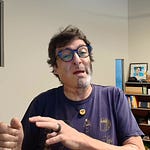It's been a profoundly interesting yet deeply sad and complex week. I spent four days in the Palestinian territories and some time in East Jerusalem. Today is Friday, and tomorrow, I'm heading to Majd Al Shams, a Druze community in the north that was recently hit by a bomb. Many people lost their lives, and countless others were injured. Tomorrow, I'll be meeting with the families of the deceased and the injured, as well as local businesses. But that's for tomorrow.
This week has been filled with personal stories and tragedies that highlight what it means to live in such a complex situation. There's an overwhelming amount of sadness—each mistake carries a heavy price, often impossible to fix. I've also witnessed examples of pure evil; bad deeds can cause disproportionate damage compared to good ones.
Listening to the daily pain people endure was incredibly tough. At times, I felt accused—not for anything I've done personally, but because I'm part of the Western world that allows this to happen, and part of Israel, which contributes to it.
I'm currently reading a book that examines three long-standing conflicts that have seen some resolution: Cyprus between Turks and Greeks, Northern Ireland versus Southern Ireland, and South Africa. The author talks about the concept of parity of respect as crucial for beginning any solution. Reading this book before my trip helped me listen and try to respect the perspectives of the other side, even though it wasn't easy.
Being attacked by COVID deniers has taught me how to accept criticism without taking it personally, which helped me understand what’s going on here. This concept of parity of respect gained new meaning during my visit—until we listen and acknowledge each other’s experiences, moving forward will be very hard.
As I listened to these complex issues that have persisted for so long, I thought about how a couple’s therapist might handle it. If Palestinians and Israelis came to me as a couple seeking therapy, I'd likely suggest they get divorced because they can't get over past grievances to think about the future. But life isn't that simple; separation isn't an option here.
In our meetings, we discussed both short-term steps and long-term goals—what leaders might initiate (top-down) versus grassroots efforts (bottom-up). While political leaders on both sides currently lack the legitimacy and power to bring about change, I found inspiration in grassroots efforts like local businesses working together on small projects.
These small initiatives may seem insignificant compared to the larger problem but are incredibly rewarding because they offer tangible ways to help. For example, I'm involved in an organization that teaches computer science to Israeli and Palestinian kids with leadership qualities over three years. These bottom-up efforts keep hope alive and show that collaboration is possible.
We need more involvement from civic society to create trust and demonstrate that collaboration can happen. When politicians eventually sit down to negotiate, they'll need examples of trust from civic society.
Lastly, I want to touch on BDS and normalization. The BDS movement boycotts activities involving both Israelis and Palestinians on the grounds that it normalizes relations. This stance is one of the biggest barriers to peace. Imagine if we could run joint educational programs or schools for talented kids from all regions—it would be a powerful example of collaboration.
We need shining examples of good behavior amidst all the negative ones each side blames on the other. How do we generate these positive examples if we don't start somewhere?
After these four days, I realized the problem was larger and more complex than I initially thought, with much more pain on both sides. Solving it will take a long time, but I remain hopeful after seeing glimpses of possibility. We don't have the luxury of separation; everyone is here together, so we must find a solution.
Wishing us all a much better future—perhaps 2025 will bring signs of a new Middle East.











